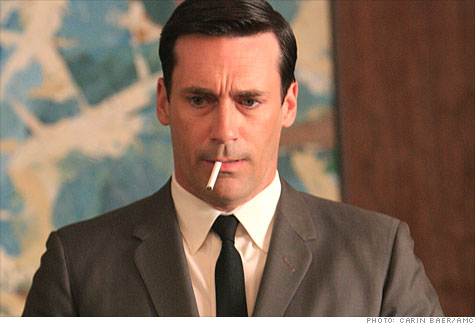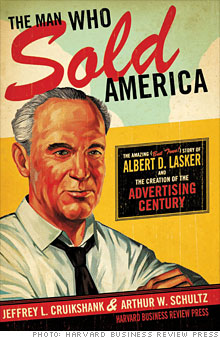
FORTUNE -- In an excerpt from "The Man Who Sold America" authors Jeffrey L. Cruikshank and Arthur W. Schultz explain how Albert Lasker, an enigmatic ad man, invented many of the tactics still used in advertising today. Here, in what served as inspiration for Don Draper's character in the AMC series "Mad Men," Lasker convinces his client American Tobacco to focus their ad budget on one brand -- Lucky Strike -- and to play up the benefits of the industry-wide practice of "toasting" tobacco.
Lord & Thomas's first piece of advice to American Tobacco must have come as a surprise: Stop advertising most of your brands.

Lasker argued that rather than maintaining many modestly successful small brands, the company needed to create one overwhelmingly powerful product that could compete with Camels and Chesterfields. "You can't live unless you have this one brand," Lasker recalled saying, "because 80 or 90 percent of the cigarette business in this country today is on this one type of cigarette.
These other cigarettes and other products were a different type of goods . . . Instead of spending a little money and a moderate amount of money on each of these fifty products, milk them all. Take what you spend on them and the milking of their profits and put it in a big push behind Luckies."
[George Washington Hill, son of Ameritcan Tobacco CEO Percival Hill, and entrusted with managing the Lucky Strike brand] agreed. As a result, the money formerly spent advertising Blue Boar -- the original Lord & Thomas account -- and most of the other minor American Tobacco products was diverted to support Lucky Strike.
The first Lord & Thomas campaign on behalf of the now-favored brand built upon the earlier concept of "toasting," which attempted to differentiate Luckies based on the preparation of the tobacco. The copy stressed the unique benefits of toasting, including improved flavor and reduced acidity, supposedly making it easier on the throat. It was classic Claude Hopkins [a Lasker protegé who later became chairman of Lord & Thomas]: true, the tobacco used in Lucky Strikes was heated to somewhere between 260 and 300 degrees during the manufacturing process -- but this was common practice in cigarette manufacturing.
From "toasted" to "Precious Voice"
The brand still wasn't doing well enough to satisfy the hugely ambitious Hill, so in 1927, Lord & Thomas began complementing the "toasted" theme with a series of advertisements that became known as the "Precious Voice" campaign. This new campaign argued that, in addition to making cigarettes easier on the throat, the vaunted toasting process actually helped protect the throat and voice.
One thing that distinguished "Precious Voice" was its target audience. At that time, the social stigma against women smoking was still powerful. Although Philip Morris had introduced the first women's cigarette in 1924 (claiming that it was "mild as May"), few women smoked openly, and most restaurants and other public places prohibited smoking by women.
But women were beginning to smoke in the home, and Lasker realized that a vast new market was ready to open up. This was brought home to him one afternoon at the Tip Top Inn, a restaurant near his Chicago home, where he was lunching with his wife. Flora tended toward obesity, and her doctor had suggested that she take up smoking to curb her appetite. But on this particular day, when she attempted to light up after lunch, the restaurant's proprietor rushed over and said that he could not permit a woman to smoke in the main dining room. If Flora wished to smoke, he continued, the Laskers would have to retire to a private room.
"It filled me with indignation," Lasker recalled, "that I had to do surreptitiously something which was perfectly normal in a place where I had gone so much. That determined me to break down the prejudice against women smoking."
No doubt the prospect of doubling the potential market for Luckies also influenced his thinking. Lasker took his idea to George Washington Hill, and told him that if American Tobacco acted decisively, the women's market might be theirs for the asking.
Precious Voice -- one of the few postwar campaigns that was largely conceived and directed by [the aging] Lasker -- grew directly out of this decision. Lasker decided that testimonials from well-respected foreign women might start to overcome the prejudice against women smokers, and he started with opera singers. "It was very natural that my mind went to the opera stars," he explained, "because at that time there were only one or two American stars, and the rest were foreign. And if I [could] get the women of the opera, it [wouldn't] be long until [I'd] be able to get the women of the stage."
The subtext, of course, was that women -- sophisticated, worldly, even exotic women -- who earned their livelihood by singing were willing to trust their precious voices to Luckies.
Precious Voice was one of the first Lord & Thomas advertising campaigns to rely heavily on testimonials, and very quickly, the campaign expanded to include almost all the stars of New York's Metropolitan Opera. Just as Lasker had anticipated, stage and screen stars (both women and men) also rushed to join the chorus of artists praising Luckies. Incredibly, none of the individuals testifying for Luckies were paid for their contributions; they considered the free publicity compensation enough.
The campaign enjoyed immediate success. "Overnight," Lasker later boasted, "the business of Luckies went up like the land in a boom field where oil has just been found."
Reprinted by permission of Harvard Business Review Press. Excerpt from The Man Who Sold America: The Amazing (But True!) Story of Albert D. Lasker. Copyright 2010 Jeffrey L. Cruikshank and Arthur W. Schultz. All rights reserved. ![]()






| Company | Price | Change | % Change |
|---|---|---|---|
| Ford Motor Co | 8.29 | 0.05 | 0.61% |
| Advanced Micro Devic... | 54.59 | 0.70 | 1.30% |
| Cisco Systems Inc | 47.49 | -2.44 | -4.89% |
| General Electric Co | 13.00 | -0.16 | -1.22% |
| Kraft Heinz Co | 27.84 | -2.20 | -7.32% |
| Index | Last | Change | % Change |
|---|---|---|---|
| Dow | 32,627.97 | -234.33 | -0.71% |
| Nasdaq | 13,215.24 | 99.07 | 0.76% |
| S&P 500 | 3,913.10 | -2.36 | -0.06% |
| Treasuries | 1.73 | 0.00 | 0.12% |
|
Bankrupt toy retailer tells bankruptcy court it is looking at possibly reviving the Toys 'R' Us and Babies 'R' Us brands. More |
Land O'Lakes CEO Beth Ford charts her career path, from her first job to becoming the first openly gay CEO at a Fortune 500 company in an interview with CNN's Boss Files. More |
Honda and General Motors are creating a new generation of fully autonomous vehicles. More |
In 1998, Ntsiki Biyela won a scholarship to study wine making. Now she's about to launch her own brand. More |
Whether you hedge inflation or look for a return that outpaces inflation, here's how to prepare. More |